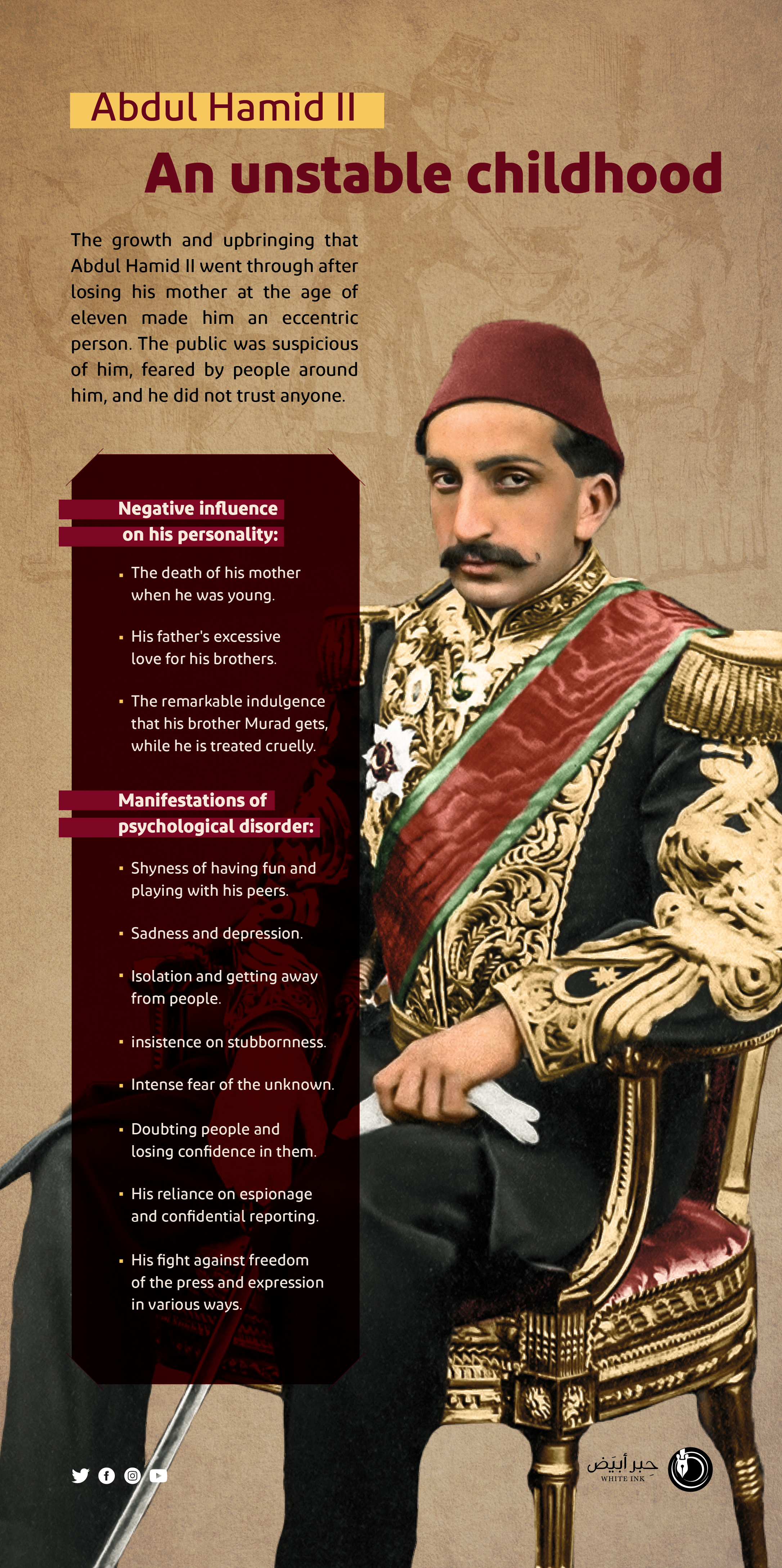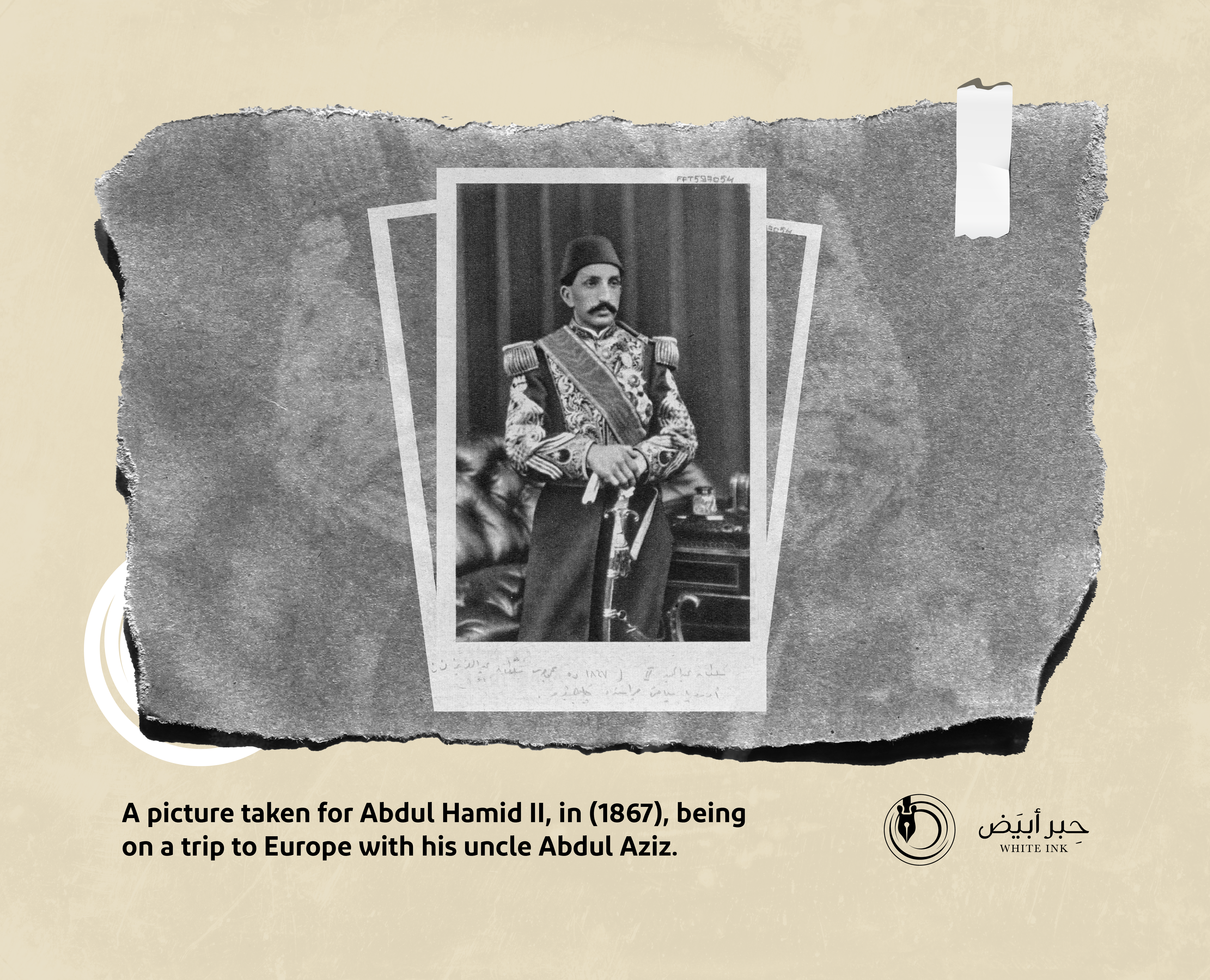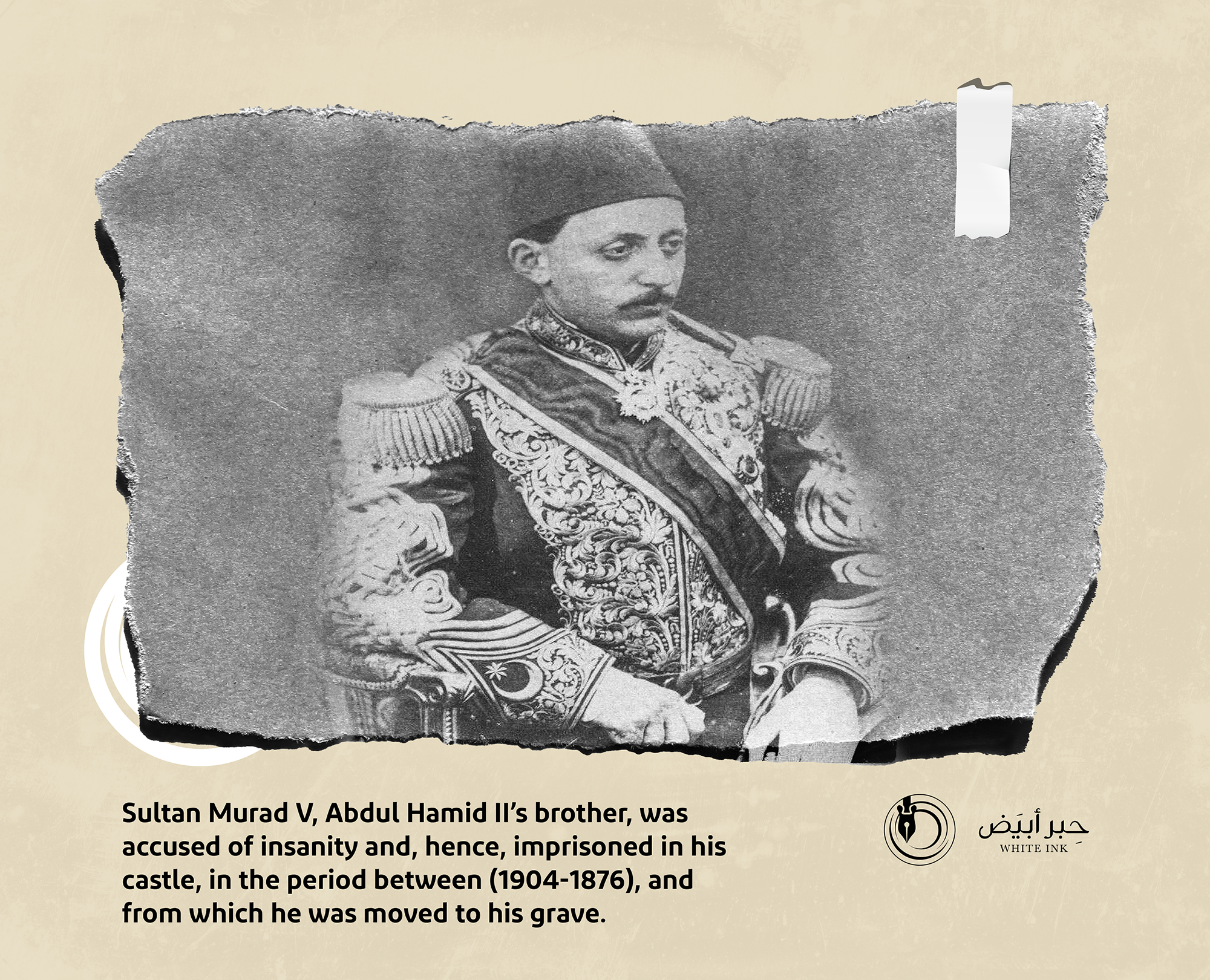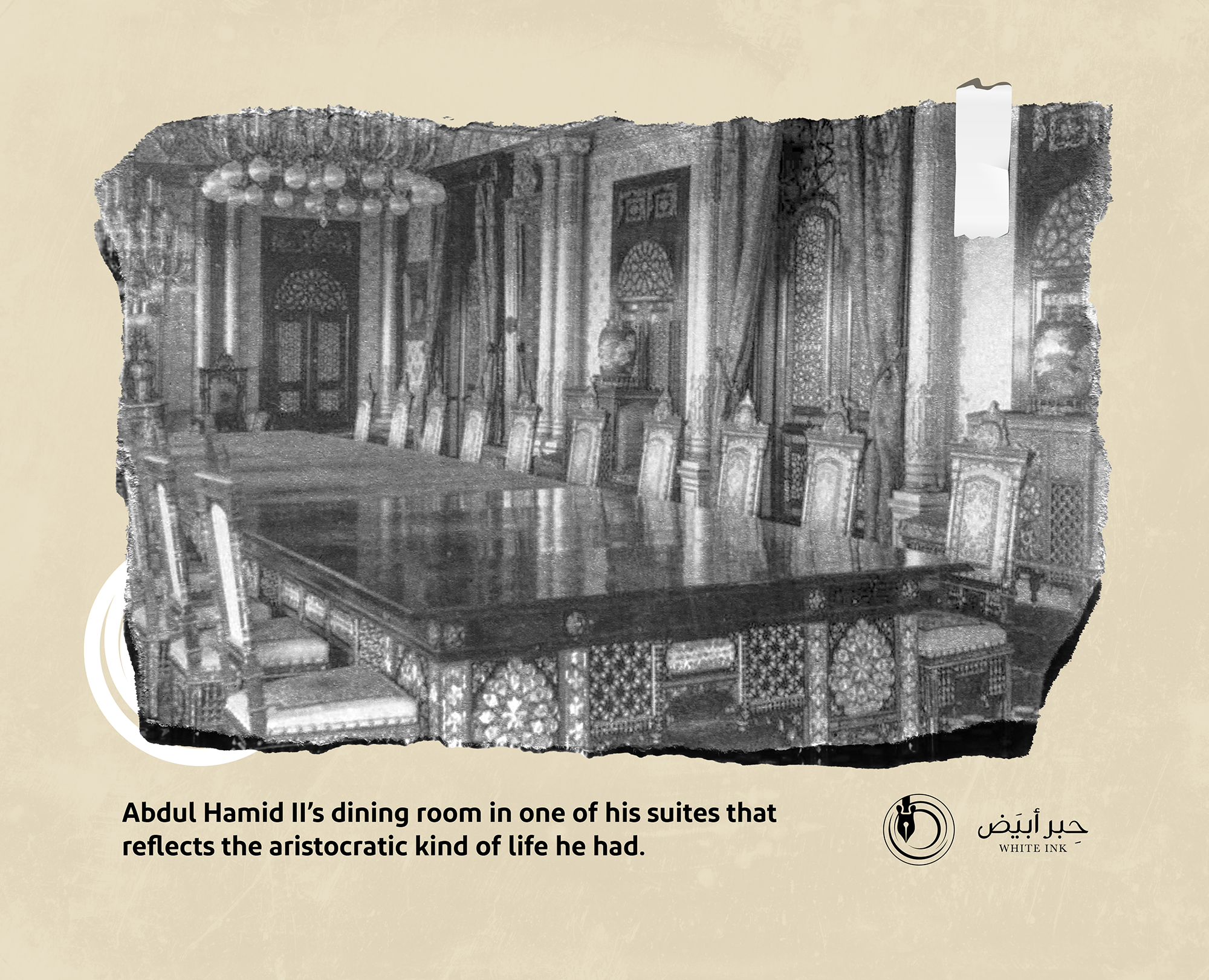
Abdul Hamid and the Story of his Infection with "Paranoia"
His father, Abdul Majeed:
"My Son is Melancholic."
He lived as a stubborn introvert ... fleeing from people.

Despite his pretense of dictatorship, he was plagued with phobia and fear.

This state of “paranoia” affected the behavior of Sultan Abdul Hamid and his actions from the time he was Prince and Crown Prince until he ascended to the reign of the Sultanate. This situation continued with him throughout his life and during his rule, and affected his administration of government from an administrative and political point of view. Those around him took advantage of this pathology to increase his condition of imagination, delusion, and suspicion in their transmission of internal and external events, and some state men who held high positions in the Empire resorted to intimidating the Sultan, throwing terror into his heart, and fabricating images of rebellion and disobedience in various corners of the state in order to consolidate their jobs and their status with the Sultan. The best example of this is the Grand Vizier Saeed Pasha, who assumed the position of Prime Minister, (Grand Vizier) more than seven times during the reign of the Sultan, due to his benefiting from the state of paranoia that Sultan Abdul Hamid was going through, and he contributed to increasing that state in him and consolidating it more and more. Some of the contemporaries of Abdul Hamid’s period hold Saeed Pasha responsible for many of the internal and external problems that the state went through. In fact, there may be some validity in this, but the one primarily to blame is the Sultan himself, as Tahseen Pasha described him as a tyrannical ruler and absolute by his nature, and that he remained under the influence of Saeed Pasha and his revelation from the day he ascended to the throne.
With his unwell psychological state, Abdul Hamid ruled the vast old empire and tightened in his reign the freedoms of people through the secret police and intelligence services, spying on people and writing confidential reports about them. Even his brother Murad V was not spared from this surveillance, espionage and writing reports on him, even though he was deprived of his will, locked in his palace. He also fought freedom of the press and curbed it by various means and methods, under the pretext of preserving the Ottoman society and its security.

After distorting his reputation and stature
Abdul Hamid insulted the humanity of his brother “Murad”
Murad V bin Abdul Majid I (1840-1904 AD), who was destined to contemplate the chaotic period in the history of the Ottoman Empire in which the struggle between the reformist and conservative movements focused. Murad’s personality was not far from that of his brother Abdul Hamid in terms of psychological distress, isolation and phobia. The circumstances that formed Murad’s personality, and cast a shadow over his emotions and interactions, are concentrated in his inability to deal with those around him or to understand the surrounding community around him, especially government men, on top of whom are the influential people.
The name most commonly used during the reign of three sultans: Abdulaziz, Mourad, and Abdul Hamid; It is Medhat Pasha. He had the upper hand in isolating Abdulaziz and Murad, and the inauguration of Abdul Hamid II. He was the Grand Vizier (Prime Minister), and the responsible for the constitutional claim. There is another name with him, which is the Minister of War, Hussein Awni Pasha, who was associated with Medhat in the events of political chaos from the ouster of Abdulaziz until the assassination of Awni during the reign of Murad V.
Sultan Abdulaziz took power in 1861 AD after his brother Abdul Majeed. As usual, the Ottomans used to practice the so-called princes’ cages, for everyone who is qualified to take over the sultanate, so that he becomes isolated from the public environment so as not to affect the sultan’s progress in his rule, either by revolution or by an organization that might worry him. The cages system came as a result of easing the law of killing brothers, which was in effect for a long period of the history of the Ottoman Empire, which caused a dynastic crisis in the Ottoman family, and accordingly, the state and the Sultanate devolved to the oldest of the Ottoman sons prepared for the Sultanate from the sons of the previous sultans.
The state was ravaged by a series of events, including European interventions by influential statesmen headed by Medhat and Awni, who had a clear influence on Murad V. Murad expressed his desire to ascend the throne after his European visits, accompanied by his uncle, during which he visited Masonic lodges, and highlighted his musical talent in composing music pieces that became international after that.
Murad was not violent, so his agreement with the ministers was that his uncle would only be removed from power. When he was hoping that things would go smoothly, he was surprised that the removal of his uncle Abdulaziz from power took place in a military coup, which ended with the killing of Abdulaziz and the rumor that he committed suicide. This affected Murad and he became suffering from the control of the ministers, to the point that he was afraid of them and expected that they would repeat the matter and execute him.
Therefore, Murad was not balanced, and he showed some irrational behavior, especially after there were assassinations in the Council of Ministers, in which the Minister of War, Hussein Awni, was killed in front of him.
He banned pens, newspapers and papers, and rumored that Murad was illiterate.

When the Ottoman Empire was living through a period of chaos and confusion, isolation, murder and mental illness of Murad; Abdul Hamid was working behind the scenes to get things going in his favor. As the second crown prince during the reign of his uncle Abdulaziz and the first after Murad, he was able to intervene by balancing his position, which began to deteriorate, but Abdul Hamid was seeking to impose himself, at a time when circumstances made him an inevitable choice for all parties to save the situation.
Abdul Hamid watched the events from afar, but he was present in the scene with the decision-makers, and did not show any reaction that would make those around him doubt his position. Therefore, it was known that he always met with Medhat Pasha, and in their meetings that were held. Medhat was aware that Abdul Hamid was the choice before them at a time when Murad was rapidly losing power, while Abdul Hamid was also well aware that no matter what they modified and formulated the political position, they would have to hand him over to the throne of the Ottoman Empire in the end. Therefore, he was keen on being in agreement and consistency with everyone who had authority, contacted the largest possible number of officials, and was keen on knowing everything that was discussed in the arena in order to remain present and absorb the event. This is what made him benefit from that in formulating the position after he took over the Sultanate, through his knowledge of the weaknesses of all those around him.
Abdul Hamid was extremely suspicious and delusional, which was considered extraordinary. He was famous for that from an early age, as his brother Murad was jokingly suspicious of Abdul Hamid, joking with him by deluding him with unreal doubts, which Abdul Hamid used to deal with in a serious way.
During the time of the confusion of Murad V’s ministers, Abdul Hamid treated them with caution and scrutinized their weaknesses well. Therefore, he did not respond to their pressure on him easily, and he did not show them his eagerness to isolate his brother Murad and assume the throne in his place, as he made them try to convince him of what he was contemplating indirectly.
Medhat and his friends went to Abdul Hamid several times before Murad was dismissed, and offered him the idea of becoming Sultan, but Abdul Hamid asked to wait for that, and he, in turn, tried to convince Medhat of the idea that Murad might recover from what he had suffered. This caused Medhat to present Murad to an Austrian doctor, and it was said that he was an Englishman named Liders Dorf, a specialist in mental and neurological diseases, and he reported that Murad’s mental condition may improve, but he may need time to return to normal. But Medhat announced the news in the newspapers that the sultan suffers from a mental illness without referring to the doctor’s saying that he may recover within weeks, and then urged Abdul Hamid to know his opinion on the constitution and the extent of his enthusiasm for announcing him if he would become a sultan. Abdul Hamid responded and expressed his conviction in the constitution in principle with no enthusiasm.
With time and the further deterioration of the situation, Abdul Hamid began to assert that if he became a sultan, the constitution would be announced and ratified, then he moved from the shadow stage to the political field, where he directed Medhat to request the approval of scholars to dismiss Murad, and to present to him a study of his reform project and the constitution. Indeed, Medhat gathered the men of the state in the house of Sheikh Al-Islam. After consultation, everyone decided the suitability of the project and the necessity to announce it, and few of them remained conservative. In the end, they agreed with the opinion of the majority.
Then Abdul Hamid delegated the ministers to the task of dismissing Murad and issuing a fatwa by Sheikh Al-Islam to depose him and pledge allegiance to Abdul Hamid, after Murad ruled only 93 days. This happened after Medhat took a promise from Abdul Hamid to announce the constitution, which is the constitution that Abdul Hamid drafted to be under his direct authority, taking advantage of Medhat’s urgency to him.
When Murad’s isolation was announced, Abdul Hamid was aware of the doctor’s report, who said that he would need weeks to recover from his mental illness. Therefore, he was quick to settle him in the Jirgan Palace, and provided him with limited entertainment, after reducing the number of his entourage, and providing him with all his requirements in order to distract him from thinking about the Sultanate, and to continue living in chaos and mental attachment that he was suffering.
On the other hand, Abdul Hamid devoted himself to Medhat and the men of the constitution, and turned it into an authoritarian document. Although Medhat benefited from the Belgian and Russian constitution in drafting his constitution, Abdul Hamid insisted on his right as a sultan to directly appoint members of the government. Therefore, the government was accountable to the sultan and not to parliament, that was unable to enact laws, and was only able to debate them before their promulgation. The Sultan retained his absolute right to hold or dissolve Parliament, so as soon as he was defeated by Russia after two years of his rule, he suspended the constitution, which remained effectively suspended and routinely in effect.
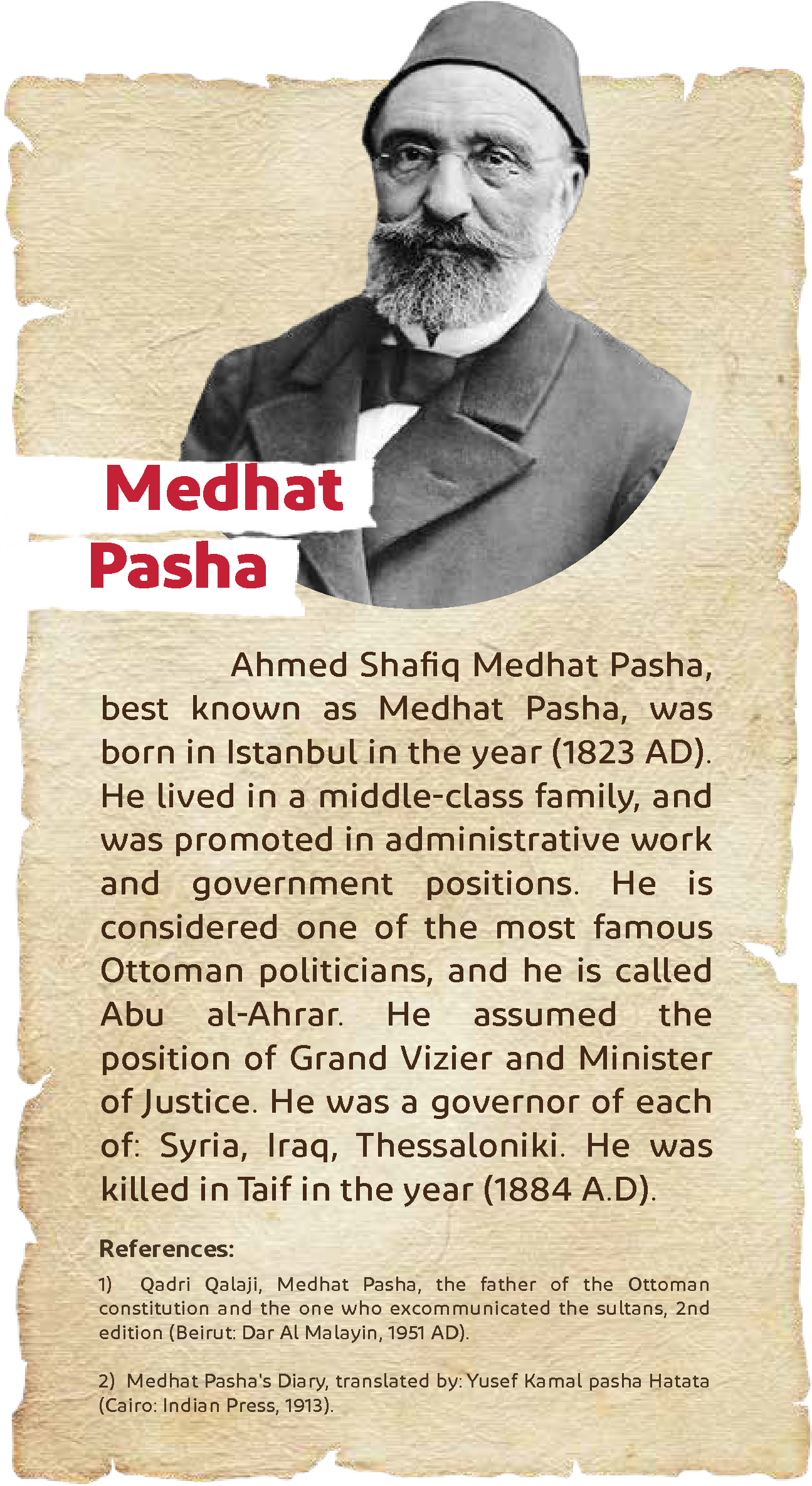
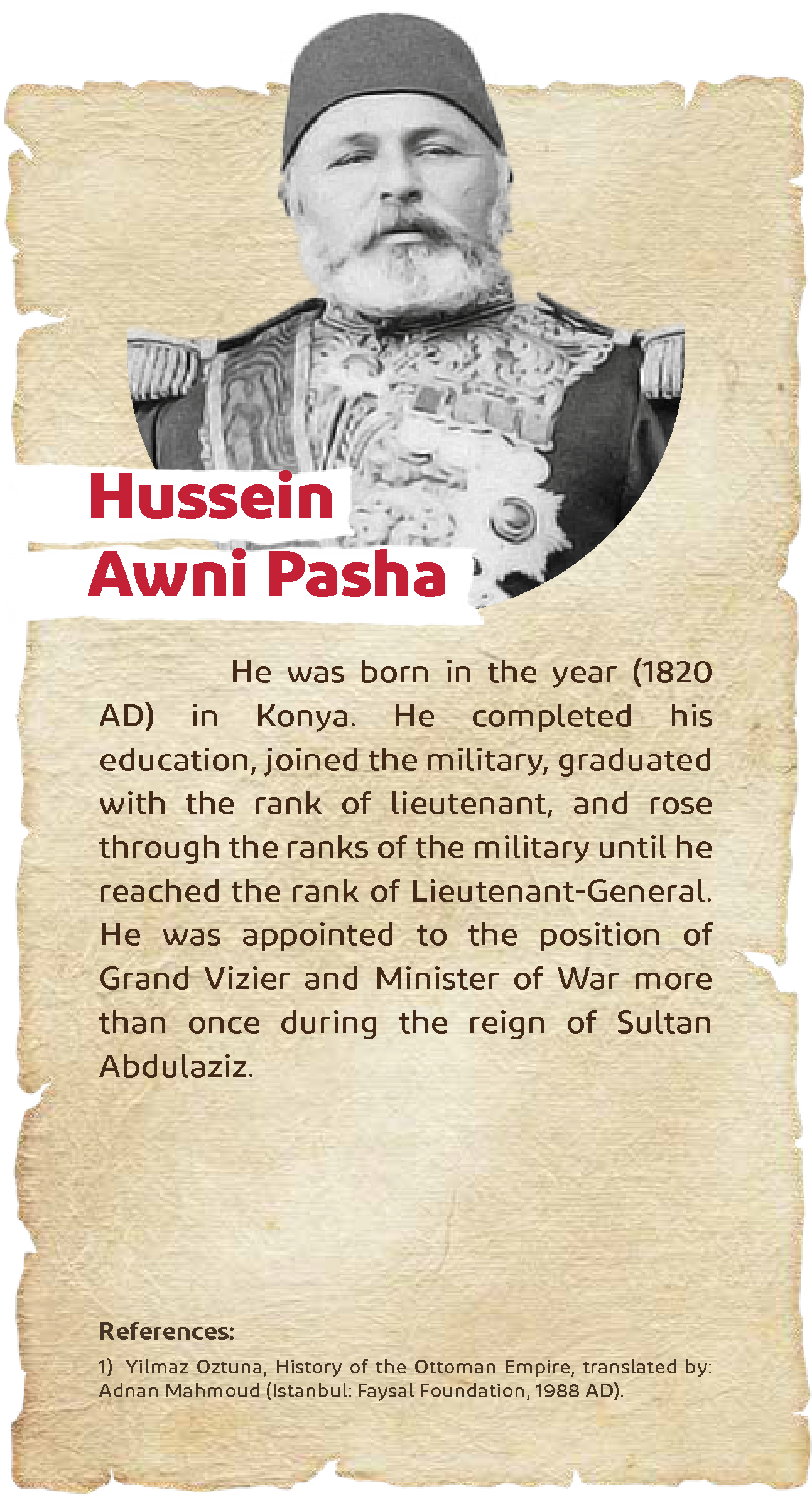
Abdul Hamid oppresses his brother Murad V:
When Murad was transferred to the Jirgan Palace, he was prevented from mixing with people, and he was forbidden to leave his palace on the order of his brother Abdul Hamid, and newspapers and books were banned from him. The matter reached the point that the guards were prevented from bringing writing tools to him in his palace, so it is said that he used charcoal to teach his children and grandchildren, after he regained his mental strength after a short period of his isolation. As long as Murad stayed in his palace, he did not set foot outside his palace until he died in 1904. The matter increased to the point that he and his family were suffering from a lack of food, and he did not have enough money to eat. His conditions worsened to the point that he and his family were in a deplorable condition, as his palace was one of the palaces that foreigners visit for tourism. At a time when a tourist delegation came to his palace, he and his family were prohibited from leaving their rooms, so that no one would see them.
Abdul Hamid had a problem with Murad, as he portrayed him in his diaries as being unconscious and not educated or educated, and this is in contrast to the reality that every reader of Murad V’s biography reads. He had contradictory views of Murad. While he used to describe him as extravagant, he says that he was known for intense greed. This is according to what Tahsin Pasha, who is close to Abdul Hamid, stated that Murad was the most loved brother of Abdul Hamid, because Abdul Hamid was impressed with Murad’s opinion and open mind. This is also another contradiction by Abdul Hamid towards Murad, as Abdul Hamid described in his diaries his pity for his brother Murad’s weak way of writing letters, and his unforgivable spelling mistakes.
One of the things that indicates the culture of Murad V is that he was in wide contact with the people of thought and literature, and this could only be achieved by being a lover of literature, culture and science. What proves this is his close relationship with Namiq Kamal, which was bothering Abdul Hamid. He used to say to Namiq: ” Kamal, you will cause the death of my brother morally and mentally”.
It is clear through tracking events and Abdul Hamid’s interventions in them before he took over, that he was planning to keep his brother Murad in a bad mental state, so that he could reach the Sultanate. This is because he was in agreement and in harmony with the argument that Medhat Pasha was highlighting of the Ottoman media, in exaggerating the presentation of Murad’s deteriorating mental state, and the fabrication of false news about him, and it has been proven through the sources that she was fabricated in many of its details.
It is clear that several dramatic details were formulated about the case of Murad V before his assumption of the Sultanate and after his removal, but it is often a very bleak and tragic drama, especially after the life of isolation imposed by Abdul Hamid on him. This is because he was considered a prisoner by his brother, and thus his humanity was insulted by the greed of power over the 19 years he spent in this situation, in which he used to practice a silent life, far from all his friends, relatives and all people, so his days were sad and miserable, in which he suffers from diabetes .
Abdul Hamid also banned the entry of books and newspapers to Murad, which gives an indication that he was not as described by Abdul Hamid in his memoirs, but rather that he is known to practice writing and if he was able to do so, he would have become the most famous Turkish writer at all. There are many evidences of him that confirm this and testify to his free thinking and wisdom. Then, if Abdul Hamid is afraid of bringing newspapers and books to him for one reason or another that can be analyzed, why was he forbidden all writing tools, such as pens and papers?
The answer to this question confirms the state of terror that Abdul Hamid was experiencing, that Murad would write his thoughts, events and analyzes, which would inevitably contradict what Abdul Hamid was trying to convey to people about him. It is also more frightening if Murad wrote his diaries, as Abdul Hamid did the same after his dismissal when he was able to write his memoirs, if it is correct to attribute them to him. He was supposed to be sanctioned on the basis of what he had done with Murad. Something like this may not be desirable to historians and political analysts.
It seems that the circumstances were stronger than Murad V and his hopes, as the state in which he was portrayed and the life that was imposed on him hides many secrets that have not been revealed so far. And if something was left behind Murad, Abdul Hamid surely either concealed it or destroyed it. This is because such an act is very compatible with the authoritarian personality of Abdul Hamid, which confirms his suffering with a conspiracy phobia, and that he surrounded himself with a large number of spies, guards and policemen. Indeed, all of Murad’s service in his exile in the palace were Abdul Hamid’s spies. They were in complete contact with him, informing him of all the details of Murad’s life. Therefore, whoever worked in the service of Murad after his dismissal, he is sentenced to isolation like him, and he cannot leave Jirgan alive. This isolation dragged many of Murad’s family and those who were working on his service.
Despite Murad’s misery, he was also known to be a unique musician, and even had a passion for piano and playing the violin. He has presented the largest number of Western musical compositions. It is said that they amounted to nearly three volumes. All this in addition to his love and attachment to architecture and painting.
Murad stayed for close to 28 years in Jirgan until he died of illness. His family continued to be placed under house arrest just as they were in Murad’s life, until the revolution against Abdul Hamid II in the year (1908AD) during the Ottoman coup, when they went out to the street for the first time in a state of hysterical joy at their salvation from the Sultan’s prison. This also confirms that Abdul Hamid did not want Murad or his family to come out of their isolation, nor to tell anything of what they keep in their minds of events or details.
He locked him up in his palace, isolated him from the outside world, and claimed his sorrow and love for him.


At the Time He Was Adoring Anything That Was German
The "Chauvinist" Sultan Was Suffering from "Arab" Phobia
Abdul Hamid II exaggerated the glorification of the Turks and compared the Turks to Germans in pride and flaunt.

These words were in the first half of his reign. When he was glorifying and priding of his Turkish racism so far as despicable fanaticism. As if the Turks were the only inhabitants who solely make up the population of the Ottoman Empire! Abdul Hamid exaggerated the comparison between the Turkish and the German elements, as we see him being boast and take pride in saying: “Now and then, the Turks were said to be the East Germans. The fact is that there is similarity between us and the Germans. Where this similarity may be a reason for our tendency towards them. As calmness, prudence, and patience over hardships are the characteristics of these two peoples. Our people are sober and solemn. Where their forbearance precedes their rage. So they endure injury for a long time. But if they get angry, it would be intense rage. In addition to boldness, integrity, kindness and generosity that are the characteristics of the Germans as they are our characteristics”. There is no doubt that such a saying arises from a view of admiration for the German race, who used to see himself as one of the purest human races. This supreme view conveys to any reader that the Sultan adopted the same chauvinism and supremacist view of the Turkish race. As this raises many marks of exclamation by the readers about this who claimed to be the caliph of the Muslims and the primary responsible for them. This who called for the Islamic League, which apparently was not invoked except in an attempt to get rid of the internal and external crises that engulfed the pillars of his state.
Indeed, the character of Sultan Abdul Hamid needs a psychological study to find out his behavior, thinking and emotions. In addition to his reactions that were issued by him during that era of the modern history. Especially that he has been known for the conditions of suspicion and uncertainty that dominated him, his actions and behavior. About this matter, Tahseen Pasha, head of the writing department at Yildiz Palace, and as he was close to the Sultan, talked in his diary about Abdul Hamid, by saying: “the illusion of Sultan Abdul Hamid, whether congenital or acquired, was an illusion that is far beyond the normal extend. This illusion had significant and sometimes painful effects on his behavior in general. However, with no doubt that part of this illusion arose from his character. As it is certain that, at the time, when he was a prince, crown prince, or sultan, the people around him did not stop raising his concerns. So they showed him concerns that exacerbate those illusions”.
Once again, we find that the Sultan mentioning in his thoughts his saying: “We have to admit, with all regret, that the British were able, through their poisoned propaganda, to sow the seeds of nationalism and intolerance in our country. As the nationalists moved in the Arabian Peninsula and in Albania”. However, the question here is why did these peoples move against the Ottoman government, which had a racist view over other peoples? This is an excellent example of the inconsistencies that the Sultan was experiencing in his treatments with the peoples and races of his empire. Here it is true that the famous Arab proverb befits him, as it says: “This man’s obviously a lunatic”.
By acknowledging in his diary: "If we lost Istanbul, the caliphate would inevitably be devolved to the Arabs”.

Perhaps, speaking of which, among the inconsistencies of Abdul Hamid II that draw attention was his comment on the proposal, which was presented to him by the Grand Vizier, Minister Saeed Pasha, regarding the transfer of the location of the government from Istanbul to Bursa. In the event that the Russians attack the capital again. He answered by saying, in his words: “If we lost Istanbul, the caliphate would inevitably be devolved to the Arabs”. Here any one stands wandering and feeling confused at this strange connection for the Turkish capital to the caliphate and the Arabs. In particular, the inevitability of the caliphate devolving to them one day again. Thus, was Sultan Abdul Hamid really concerned of the Arab nation? Or was he respecting and appreciating them as he was pretending to be on occasions; or was it the concern of losing the legitimacy of his rule and the devolving of the caliphate to those it was swiped from? Or was that what actually was in the mind and conscience of the Sultan among his illusions that were uttered by his tongue? There is no doubt that the illusion and suspicion of Sultan Abdul Hamid II reached beyond extent. As he lived under those illusions for the remainder of his reign, ending to be deposed.


